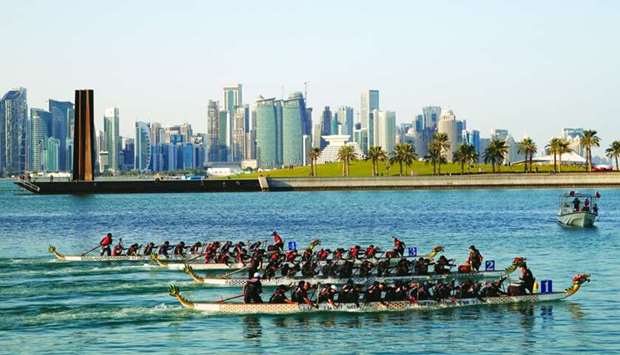Qatar’s economy has the ability to maintain growth with contributions from hydrocarbon as well as non-hydrocarbon sectors, noted QIIB CEO Dr Abdulbasit Ahmed al-Shaibei.
Global rating agencies including Moody’s and S&P have upgraded Qatar’s sovereign ratings recently and maintained stable outlook.
“All estimates indicate that Qatar will achieve growth this year, ranging between 4% and 5%. This is considered one of the best rates globally. This must be seen in the backdrop of economic crises we are seeing in some countries around the world,” the prominent Qatari banker said when asked whether the Qatari economy will slow down after the FIFA World Cup Qatar 2022.
The North Field expansion will raise Qatar's production capacity of liquefied natural gas to 126mn tonnes annually, which is the largest project in the history of global LNG industry.
“We are proud that our country will maintain leadership in the field of liquefied natural gas. For the Qatari banking sector, there are certainly key opportunities that can be tapped in areas such as project financing, which includes pipelines, infrastructure, tankers, storage containers, and processing plants. The Qatari banking sector is a reliable and important partner in various projects that drive the national economy,” al-Shaibei noted.
Qatar’s focus on developing knowledge-based and tourism and aviation industries will contribute to its economic diversification initiatives, he said.
As for tourism, al-Shaibei said, “It is a sector with great opportunities. Qatar has already become a global tourist destination thanks to phenomenal development in infrastructure, hospitality, and the leadership enjoyed by our national carrier – Qatar Airways. Efforts are being made to turn Qatar into a leading destination in medical tourism, as well as in higher education by attracting students from many countries.”
On QIIB’s focus on the local market, he said there are “promising opportunities” in Qatar and the country would remain the bank’s "top priority".
“As for external expansion, even if we focus on the local market, we will not neglect opportunities abroad if they are of low risks with potential for good returns.
“Currently, we are proceeding with our investment in Morocco through Umnia Bank, which has expanded very well with some 48 branches in the kingdom. Recently, we signed a partnership agreement to establish the Takaful Insurance Company in Morocco in partnership between Atlanta Insurance Company, Moroccan Real Estate and Tourism Loan Bank – CIH and Qatar Islamic Insurance Company.
On the Treasury Sukuk launched recently by the Qatar Central Bank (QCB), al-Shaibei said, “The monetary policy of the Qatar Central Bank is managed very wisely. Certainly, the issuance of treasury bonds is a positive matter and considered one of the important tools that enable us as Islamic banks to invest liquidity surpluses, if any.”
Global rating agencies including Moody’s and S&P have upgraded Qatar’s sovereign ratings recently and maintained stable outlook.
“All estimates indicate that Qatar will achieve growth this year, ranging between 4% and 5%. This is considered one of the best rates globally. This must be seen in the backdrop of economic crises we are seeing in some countries around the world,” the prominent Qatari banker said when asked whether the Qatari economy will slow down after the FIFA World Cup Qatar 2022.
The North Field expansion will raise Qatar's production capacity of liquefied natural gas to 126mn tonnes annually, which is the largest project in the history of global LNG industry.
“We are proud that our country will maintain leadership in the field of liquefied natural gas. For the Qatari banking sector, there are certainly key opportunities that can be tapped in areas such as project financing, which includes pipelines, infrastructure, tankers, storage containers, and processing plants. The Qatari banking sector is a reliable and important partner in various projects that drive the national economy,” al-Shaibei noted.
Qatar’s focus on developing knowledge-based and tourism and aviation industries will contribute to its economic diversification initiatives, he said.
As for tourism, al-Shaibei said, “It is a sector with great opportunities. Qatar has already become a global tourist destination thanks to phenomenal development in infrastructure, hospitality, and the leadership enjoyed by our national carrier – Qatar Airways. Efforts are being made to turn Qatar into a leading destination in medical tourism, as well as in higher education by attracting students from many countries.”
On QIIB’s focus on the local market, he said there are “promising opportunities” in Qatar and the country would remain the bank’s "top priority".
“As for external expansion, even if we focus on the local market, we will not neglect opportunities abroad if they are of low risks with potential for good returns.
“Currently, we are proceeding with our investment in Morocco through Umnia Bank, which has expanded very well with some 48 branches in the kingdom. Recently, we signed a partnership agreement to establish the Takaful Insurance Company in Morocco in partnership between Atlanta Insurance Company, Moroccan Real Estate and Tourism Loan Bank – CIH and Qatar Islamic Insurance Company.
On the Treasury Sukuk launched recently by the Qatar Central Bank (QCB), al-Shaibei said, “The monetary policy of the Qatar Central Bank is managed very wisely. Certainly, the issuance of treasury bonds is a positive matter and considered one of the important tools that enable us as Islamic banks to invest liquidity surpluses, if any.”


